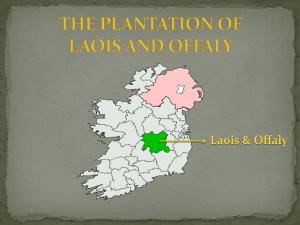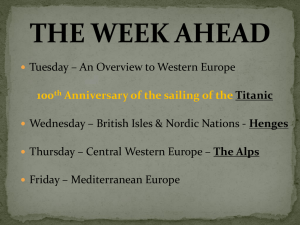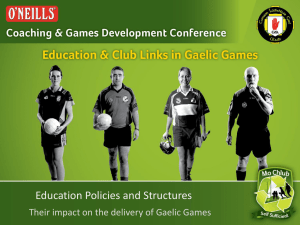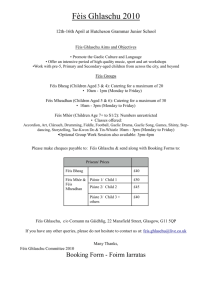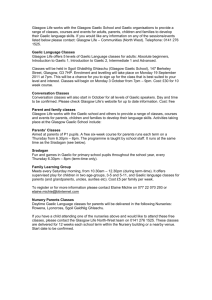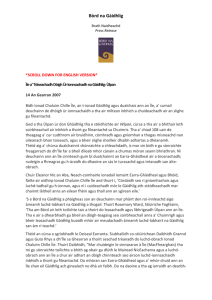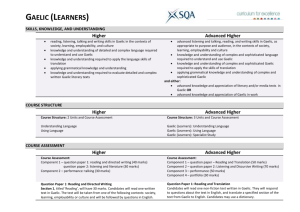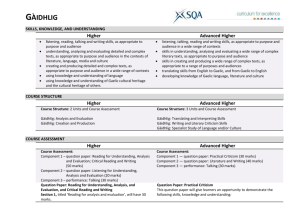Gaelic arts have a key role in language survival
advertisement
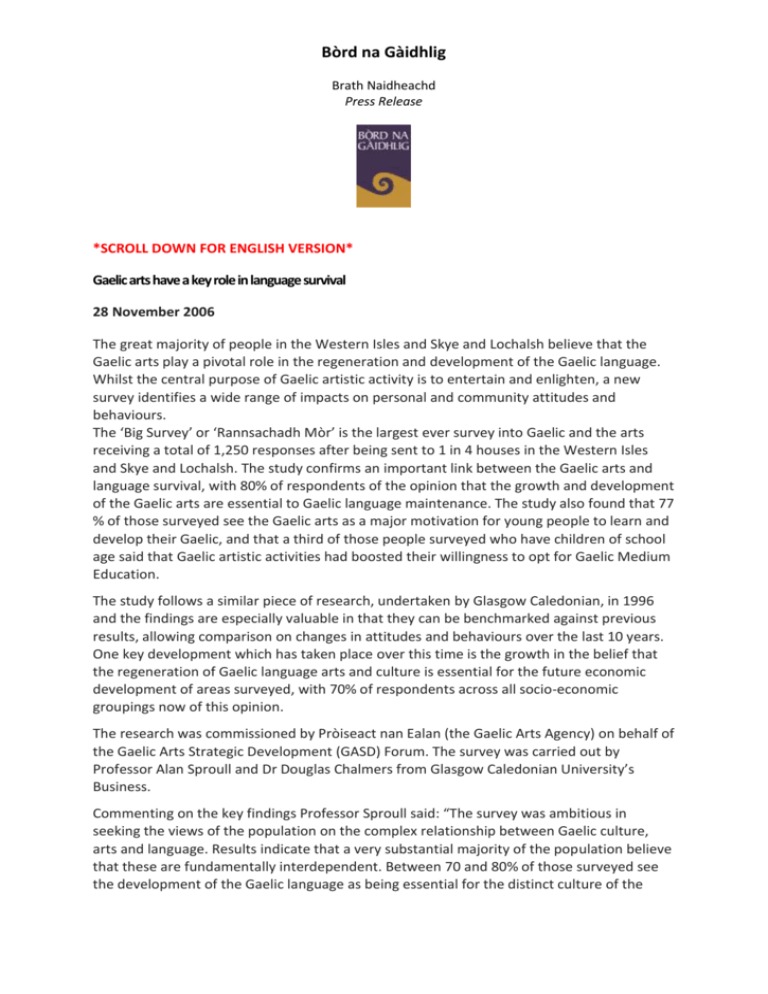
Bòrd na Gàidhlig Brath Naidheachd Press Release *SCROLL DOWN FOR ENGLISH VERSION* Gaelic arts have a key role in language survival 28 November 2006 The great majority of people in the Western Isles and Skye and Lochalsh believe that the Gaelic arts play a pivotal role in the regeneration and development of the Gaelic language. Whilst the central purpose of Gaelic artistic activity is to entertain and enlighten, a new survey identifies a wide range of impacts on personal and community attitudes and behaviours. The ‘Big Survey’ or ‘Rannsachadh Mòr’ is the largest ever survey into Gaelic and the arts receiving a total of 1,250 responses after being sent to 1 in 4 houses in the Western Isles and Skye and Lochalsh. The study confirms an important link between the Gaelic arts and language survival, with 80% of respondents of the opinion that the growth and development of the Gaelic arts are essential to Gaelic language maintenance. The study also found that 77 % of those surveyed see the Gaelic arts as a major motivation for young people to learn and develop their Gaelic, and that a third of those people surveyed who have children of school age said that Gaelic artistic activities had boosted their willingness to opt for Gaelic Medium Education. The study follows a similar piece of research, undertaken by Glasgow Caledonian, in 1996 and the findings are especially valuable in that they can be benchmarked against previous results, allowing comparison on changes in attitudes and behaviours over the last 10 years. One key development which has taken place over this time is the growth in the belief that the regeneration of Gaelic language arts and culture is essential for the future economic development of areas surveyed, with 70% of respondents across all socio-economic groupings now of this opinion. The research was commissioned by Pròiseact nan Ealan (the Gaelic Arts Agency) on behalf of the Gaelic Arts Strategic Development (GASD) Forum. The survey was carried out by Professor Alan Sproull and Dr Douglas Chalmers from Glasgow Caledonian University’s Business. Commenting on the key findings Professor Sproull said: “The survey was ambitious in seeking the views of the population on the complex relationship between Gaelic culture, arts and language. Results indicate that a very substantial majority of the population believe that these are fundamentally interdependent. Between 70 and 80% of those surveyed see the development of the Gaelic language as being essential for the distinct culture of the Bòrd na Gàidhlig Brath Naidheachd Press Release Hebrides; they see Gaelic culture as being dependent on healthy and developing artistic activity; they see this artistic activity as being essential for the maintenance of the language and as a major motivator for the young to learn or develop the language. “The survey supports the view that Gaelic artistic activity is an essential, central aspect of Gaelic cultural and linguistic development. This suggests that the developing plan for Gaelic in Scotland should reflect the deep complimentary relationship between education and ‘the arts’ in its strategy for Gaelic development.” As well as attitudes and opinions, the study also looked at consumption of, and demand for the Gaelic arts. The results confirm a high level of arts and cultural uptake that is above the national average, socially inclusive and growing. The biggest constraint on participation and consumption is access – both geographical and, with respect to television, programme scheduling. Commenting on these findings, Audience Development Manager for GASD, Kirstie Anderson, said: “The survey data provides a goldmine of detailed information on people’s current arts interests, and their future aspirations, and this will be immensely valuable in developing future Gaelic arts audiences and services”. Pròiseact Nan Ealan Director, Malcolm Maclean, welcomed the survey report and said: “This survey confirms that the communities in the key Gaelic-speaking areas have a growing confidence in their own language and culture. It is heartening to see such positive results from such a large-scale survey. Everyone has a view on issues of arts and language and culture but there has been very little objective research into the overall balance of views in the community. This report provides clear evidence that the community sees these issues as highly important and this is a valuable step forward for policy makers.” GASD Chair, Agnes Rennie, said: “The survey results are a great affirmation for the Gaelic Arts sector of the activities that are taking place regularly now throughout the area. The Gaelic Arts have delivered in terms of economic impact and community regeneration, and we are now able to provide quantitative and qualitative evidence to ensure that support and investment continues at an appropriate level.” Chairman of Highlands and Islands Enterprise (HIE), William Roe, said: “This new research is a hugely important indicator of the positive and tangible effects Gaelic arts and cultural activities have on promoting Gaelic language development across the region. This in turn creates a strong sense of place, increasing confidence and vitality in communities and businesses, all of which will ultimately drive forward sustainable economic growth in the Highlands and Islands.” Bòrd na Gàidhlig Chief Executive Allan Campbell said, “Bòrd na Gàidhlig is very aware of the importance of the arts as both a barometer of community interest in Gaelic and also as a conduit which brings people to learn the language and participate in its living culture. This is Bòrd na Gàidhlig Brath Naidheachd Press Release why the Bòrd was happy to help fund this work. The Bòrd welcomes the publication of this research and congratulates GASD and Professor Sproull. “This new information will be extremely valuable in informing the final drafting, and the implementation, of the National Plan for Gaelic. It will also be immensely useful to public organisations as they develop and implement their Gaelic Language Plans. Demonstrating a growing interest and participation in Gaelic cultural activity, this information will also increase awareness and boost confidence within Gaelic communities across Scotland.” The report was funded by the Scottish Arts Council and Bòrd na Gàidhlig, and was launched today (Monday 27th November) in the Head Office of Bòrd na Gàidhlig in Inverness by HIE Chair Willy Roe, Bòrd na Gàidhlig Chair Allan Campbell and GASD Chair Agnes Rennie spoke. GASD and PnE also acknowledge HIE’s support for Gaelic language and arts development. To download a copy of the report go to: http://www.gaelic-arts.com/rannsachadhmor • The research was conducted independently by Prof Alan Sproull and Dr Douglas Chalmers at the Caledonian Business School, Glasgow Caledonian University. The funding bodies have not sought to influence research design nor play any part in the analysis of data or in the production of the final report. • The postal survey gathered information via questionnaires sent to 7,600 adults in the targets areas (25% of the adult population, selected randomly). As such it is the largest survey of its type ever held in the area. • The analysis of the postal survey results was compared to those generated by a broadly similar exercise undertaken (at Glasgow Caledonian University) in 1996. This gave the researchers a unique opportunity to describe and analyse change over the last decade. Key conclusions in the report include: Arts and cultural activities have a high take-up/participation rate in the territories investigated, so any impacts are broadly distributed. Take-up rates are growing, albeit modestly. Take-up/participation is socially inclusive, so again impacts are broadly distributed. In addition to their central purpose (to entertain and enlighten) Gaelic arts activities appear to impact on individual attitudes and behaviours in a manner that strongly supports key language development variables. Bòrd na Gàidhlig Brath Naidheachd Press Release Social perceptions support the proposition that collectively Gaelic arts activities are shifting behaviour within local communities in ways that strongly support the maintenance and development of the language. Although not central to its purpose, Gaelic artistic activity appears to make an important contribution to wider economic and social development objectives, with over 70% now seeing Gaelic development as essential to economic development. The perception that healthy and growing Gaelic artistic activity is essential to the development of the language is very widely shared by the surveyed population, this is especially true of Gaelic speakers. The linkage between arts and education (both formal and informal) in motivating learners, developing speakers, ‘validating’ the language in the eyes of speakers and further developing Gaelic as a living language appears to be very strongly supported across the population. Organisations • The GASD Forum acts collectively on behalf of 6 key Gaelic arts organisations: Pròiseact nan Ealan, An Comunn Gàidhealach, Fèisean nan Gàidheal, Comhairle nan Leabhraichean, Tosg, and Seirbheis nam Meadhanan Gàidhlig. The GASD Programme is managed by Pròiseact nan Ealan. • Pròiseact nan Ealan (PNE) is the national development agency for the Scottish Gaelic arts. PNE is based in Stornoway, Isle of Lewis, but works nationally and internationally. It is a registered charity and employs a staff of twelve. Its key stakeholders are the Scottish Arts Council, Highlands and Islands Enterprise and Bòrd na Gàidhlig. PNE is not a funding agency but researches, develops and pilots new initiatives in the Gaelic arts. When pilot projects prove sustainable they are set-up as independent companies. Past PNE initiatives include Fèisean nan Gàidheal, the Ceolas summer school and the Tosg theatre company. PNE productions such as An Leabhar Mòr: The Great Book of Gaelic, have won an extensive range of awards. www.gaelic-arts.com For more information, interviews or photographs, please contact: Kirstie Anderson Bòrd na Gàidhlig Brath Naidheachd Press Release Audience Development Manager, GASD Mobile: 07917785462 Kirstie@gaelic-arts.com Professor Alan Sproull, Associate Dean Caledonian Business School Mobile: 07900 088 541 Alansproull@yahoo.co.uk
